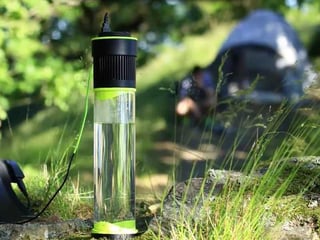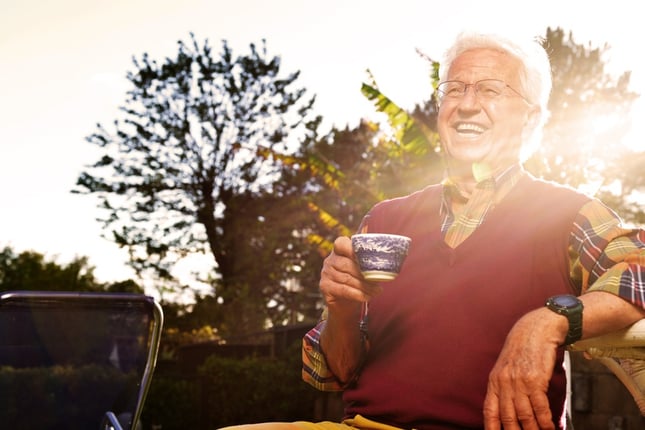As Louisville residents know all too well, mid- to late summer temperatures here routinely reach into the high 80s and 90s. On top of that, the humidity can be stifling. Heat emergencies are quite a challenge indeed for seniors living in Kentucky and Southern Indiana.
The U.S. Centers for Disease Control and Prevention (CDC) estimate that, annually, about 600 Americans die from extreme heat. Elderly people who live alone are especially vulnerable.
Follow these expert tips and tactics for keeping your older loved one cool and safe during the dog days.
1. Prevent heat stroke
Many seniors enjoy getting outside for daily walks, gardening, or other activities. If your parent is one of them, make sure that he or she is properly prepared for the hot, muggy weather.
When outside in the summer heat, elders should:
- Wear sunscreen (SPF 30) on all exposed skin.
- Wear a wide-brimmed, easy-breathing hat to shield eyes and neck from the sun.
- Wear UV-blocking sunglasses (especially those seniors with cataracts or macular degeneration).
- Wear light-colored, lightweight clothing.
- Long sleeves and long trousers can protect arms and legs from sunburn, but they can also increase heat retention. Again, elders should wear only lightweight, breathable, light-colored fabrics during the hot summer.
- Limit time spent outdoors during the heat of the day, especially during heat emergencies.
- Avoid yard work, weeding, or other moderate-to-heavy exercise during the hot afternoon hours. Best to leave these for the early morning and the cooler evening, or better yet, to enlist help from younger friends, family members, or neighbors.
- If your parent has dementia and is at risk of wandering in the heat, try these Alzheimer’s Association tips for preventing wandering mishaps.
2. Keep them cool
If your parent’s home doesn’t have central air, consider installing energy-efficient window air conditioning units. They’re easy to put in and could save your parent’s life during a heat emergency.
Or, consider enrolling your parent in an adult day program for the summer. Click here for a list of adult day programs in the Louisville area.
3. Keep them hydrated
Dehydration is a common problem among seniors on a normal day, let alone on a hot, summer afternoon.

As a person ages, his or her sense of thirst can diminish. Thus, an elderly person can think he or she is drinking enough water, but still be clinically dehydrated. And that’s a serious issue, because water is essential for regulating body temperature; too little, and seniors become more susceptible to heat stroke.
Proper hydration is also important for maintaining
blood volume. Dehydration can cause blood pressure to drop critically low, which can in turn cause dizziness or loss of consciousness, falls and serious fall-related injuries, organ failure, or even death.
When you check in on your parents, find out how much water they’re drinking. The recommended daily intake is 48 to 64 ounces per day — and more if heat or activity is making them sweat.
If your parents complain (as many folks do) that water “doesn’t taste like anything,” encourage them to drink diet Gatorade (the G2 series, which has less sugar than regular Gatorade), Vitamin Water Zero, Crystal Light or other non-sugary sports drinks.
Make sure they lay off alcohol and caffeine — they increase urine and sweat production and can cause dehydration.
4. Know the signs of serious dehydration and heat exhaustion
Mild dehydration is easily treated at home by giving clear, non-caffeinated, non-carbonated fluids. Its symptoms can include any or all of the following:
- Dry mouth
- Dry, red eyes
- Headache
- Wooziness, light-headedness, faintness, or dizziness
- Mild muscle cramps
- Dark-colored urine
- Unusually slow bowels
If your parent exhibits any of the following, though, he or she could be critically dehydrated, seriously ill, or going into shock, and should be seen immediately in the emergency room:
- Drastic pallor
- Profuse sweating
- Chills, even though the ambient temperature is hot
- Confusion or inability to concentrate
- Unsteadiness when standing, transitioning, or walking
- Low blood pressure
- Irregular, shallow, or racing pulse
- Shallow, irregular, or labored breathing
- Confused or incoherent speech
- Falls
- Loss of consciousness
5. Remember: heat and humidity make respiratory illnesses worse
Stagnant Ohio Valley summers are excellent for trapping allergens, industrial pollutants and fossil fuel fumes in our air (that’s why authorities advise you to wait until the cooler evening hours to fill up your gas tank or mow your lawn during heat emergencies).
If your parent has allergic asthma or a respiratory illness, he or she will be more vulnerable to summertime dips in air quality and might need to carry a rescue inhaler. Talk to your parent’s doctor to see if this is the right course of action.
And if your mom or dad uses an oxygen tank, make sure he or she has at least one full tank in reserve.
Remember to check on your elders often.
This summer, make sure your parent is being properly monitored. If work prevents you from checking in frequently, arrange for a family member or friend to go in your stead.
Or, consider bringing in a full-time residential caregiver or home health care provider, enrolling your parent in an adult day care, or moving your parent into a residential retirement community in Louisville.
Whichever course of action you and your aging loved ones decide on, take time to carefully weigh the options for obtaining the best elder care — for their sake and for yours.
Learn more about Episcopal Church Home’s person-centered approach to senior care.
If your older loved one needs residential retirement care in Louisville, we’d love to show you the difference holistic care can make in seniors’ overall well-being.
Click here to learn more about our senior services — from assisted living to residential memory care — then come take a tour of our Kentucky retirement community.













